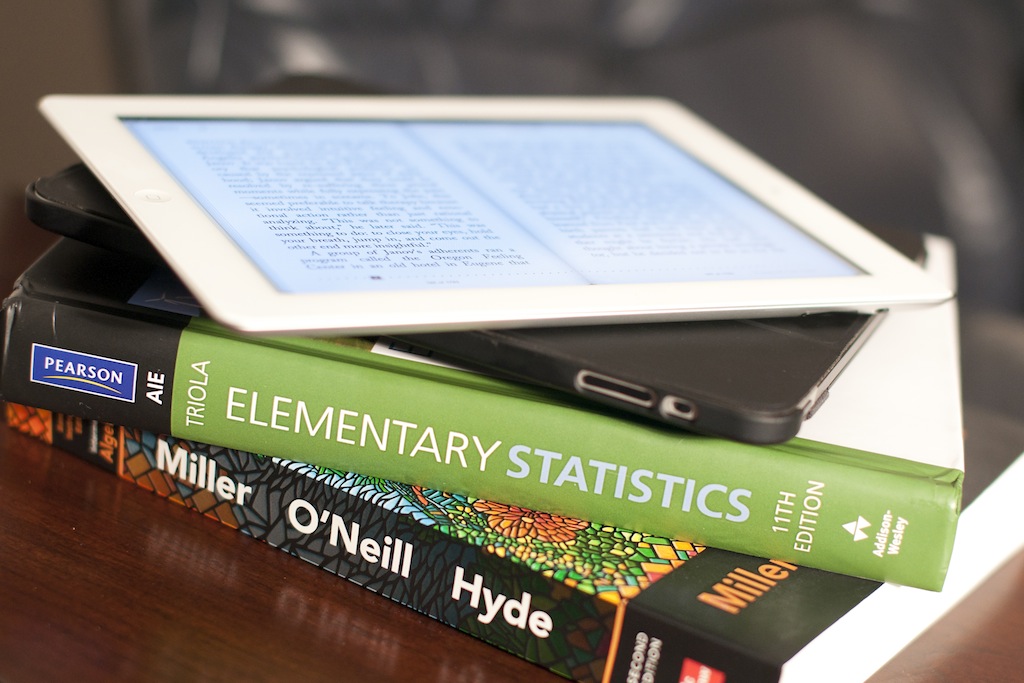Paper books vs. iBooks and Kindle books

There's an interesting debate taking place about the merits and virtues of modern electronic books like Apple's iBooks or Amazon's Kindle books and their traditional counterparts -- old fashioned paper bound and proper.
They're qualitatively different, inarguably. The feel of board and cloth and leather is warm and textured compared to the crisp coolness of glass, aluminum, and plastic. The gentle sound of pages flipping is vastly different than a tap or swipe or click. The sharp smell of a fresh new novel or musky scent of an old tome exists in a different dimension from the relative sterility of chips and displays.
Yet the weight, permanence, and nostalgia of traditional books can be a disadvantage when it comes to carrying them, correcting them, and moving the state of the art of knowledge forward once again.
Ben Brooks laments this, almost romantically.
I can tell you from first hand experience that the reading experience is very different on each of the different mediums and that’s why the distinction matters to me. I don’t care which version you bought because it changes what you read, but I do care because it may not be the same as the book I read (sometimes in the minor content differences, but always in experience and layout).
Marco Arment does not, functionally.
When I start reading, the form of the book quickly disappears. Just as I don’t notice the individual letters in each word, I stop noticing the layout, the font, the paper, the binding, and every other physical artifact because I’m focused on the writing.
Dieter Bohn thinks we're getting ahead of ourselves.
With ebooks, we're still looking at the equivalent of the day after Gutenberg printed his first Bible. We need to decide which paper book "specs" are important and ensure that they get recreated in our new digital world. We also need to ensure that these digital equivalents are at least as free and unfettered as paper books are now. We've already surpassed paper technology in a number of areas. However we are not giving nearly enough attention to the very things that made paper books flourish in the first place. The most important specs are the ones you take for granted.
Here's the thing -- once upon a time we passed down our stories between generations. Then we carved them into stone, brushed them on papyrus, illuminated them on scrolls, and eventually pressed them into print. We lost the voices of our parents, the lines of our hand, the power of our art, the uniqueness of our craft. But we gained volume and the democratization of information. Beauty gave way to volume.
Master your iPhone in minutes
iMore offers spot-on advice and guidance from our team of experts, with decades of Apple device experience to lean on. Learn more with iMore!
Each transition has been painful. Each transition has been decried and denounced. Yet, inexorably, the new has overtaken the old. Even if it's never fully supplanted it. We still tell stories. We still practice calligraphy. We still work at leading and kerning. iBooks and eBooks won't wipe out traditional books any more than non-traditional books wiped out message mediums older than they. Those mediums will shrink, perhaps, and become the providence of craftsman and collectors, enthusiasts and artists, and the very same folk who still enjoy wooden toys, vinyl albums, and pre-iPhone phones.
Meanwhile, iBooks, Kindle books, and other forms of digital books will continue to crawl out of the primordial ooze and make more content more available to more people (and children) than ever before. And perhaps they'll recapture some of the magic of mediums past, the way Audible has voice and InDesign has done digital press.
iBooks, Kindle books, and their ilk are not perfect, not yet and maybe never, but they're the future. Until the next transition.

Rene Ritchie is one of the most respected Apple analysts in the business, reaching a combined audience of over 40 million readers a month. His YouTube channel, Vector, has over 90 thousand subscribers and 14 million views and his podcasts, including Debug, have been downloaded over 20 million times. He also regularly co-hosts MacBreak Weekly for the TWiT network and co-hosted CES Live! and Talk Mobile. Based in Montreal, Rene is a former director of product marketing, web developer, and graphic designer. He's authored several books and appeared on numerous television and radio segments to discuss Apple and the technology industry. When not working, he likes to cook, grapple, and spend time with his friends and family.
